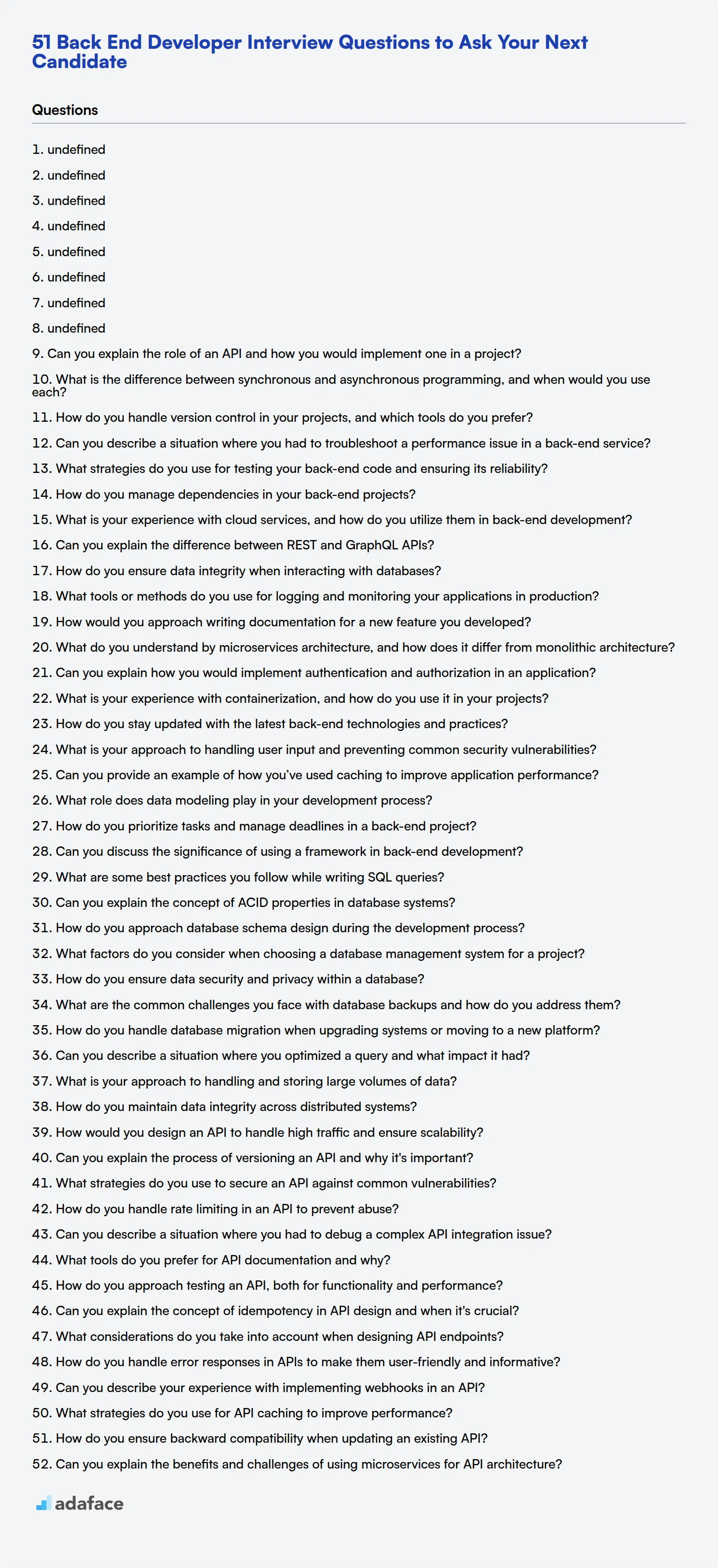Hiring the right Back End Developer is crucial for any tech-driven company's success. A well-structured interview process helps identify candidates with the necessary technical skills and problem-solving abilities.
This blog post provides a comprehensive list of interview questions for Back End Developers, covering general topics, junior-level assessments, database management, and API integration. We've organized the questions into four sections to help you evaluate candidates effectively across different areas of expertise.
By using these questions, you can gain valuable insights into a candidate's technical knowledge and approach to real-world scenarios. Consider pairing these interview questions with a pre-employment assessment to get a holistic view of each candidate's capabilities.
Table of contents
8 general Back End Developer interview questions and answers to assess applicants
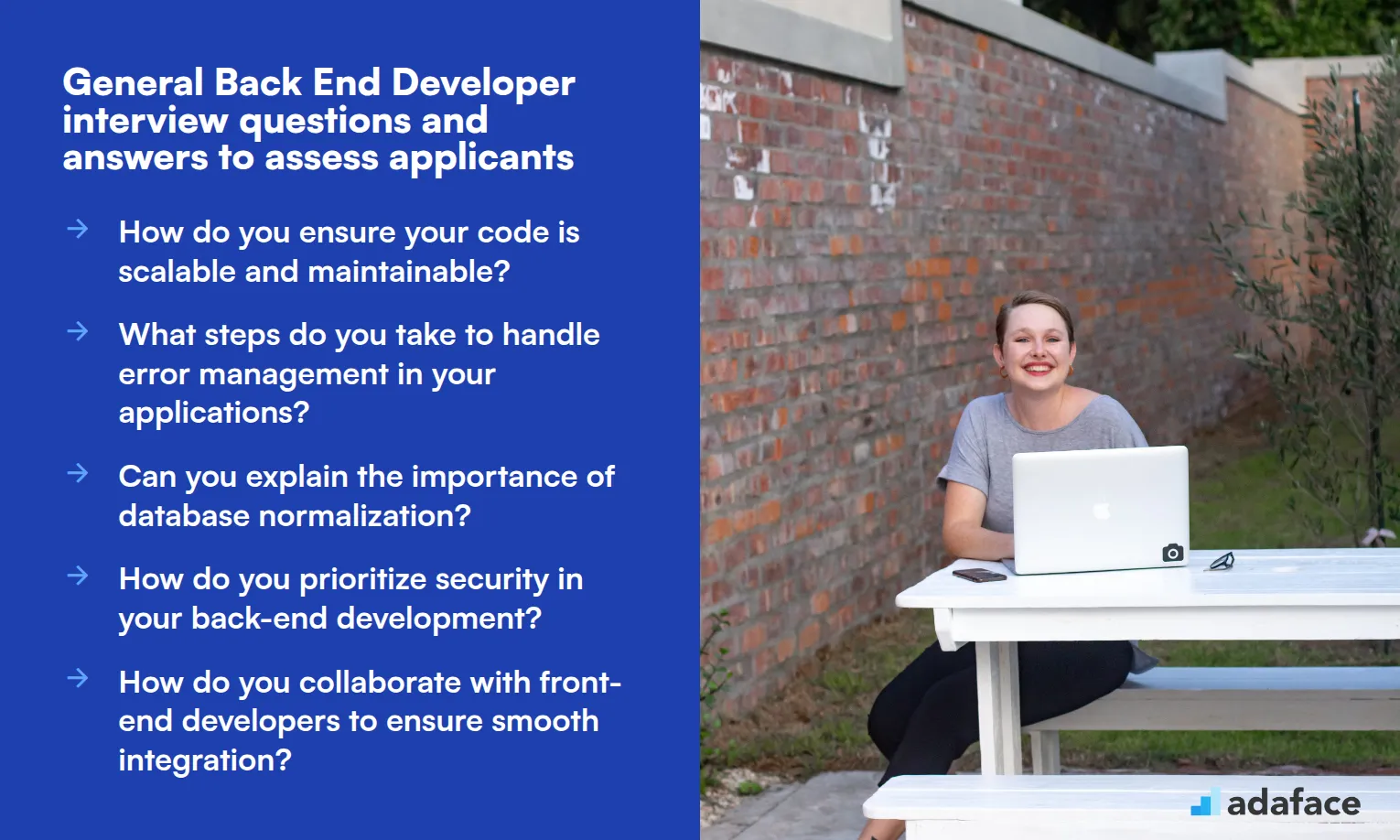
When interviewing for a Back End Developer role, having a curated list of questions can be your secret weapon. This list is designed to help you gauge not only the technical acumen but also the problem-solving prowess and adaptability of your candidates. Dive into these questions when you want to ensure that your next hire is both technically sound and a great fit for your team.
1. How do you ensure your code is scalable and maintainable?
Scalability and maintainability are crucial for the longevity and efficiency of any software system. A candidate might explain that they achieve scalability by designing a modular architecture, using efficient algorithms, and optimizing database queries. For maintainability, they could mention code documentation, following coding standards, and writing unit tests.
An ideal candidate should demonstrate a balance between writing clean code and designing scalable systems. Look for examples from their past experiences where they successfully scaled an application or improved code maintainability.
2. What steps do you take to handle error management in your applications?
Effective error management involves anticipating potential errors and implementing strategies to handle them gracefully. Candidates might mention logging errors, using try-catch blocks, and building custom error classes to provide meaningful error messages.
Strong answers should highlight an understanding of user experience and system stability. Look for answers that detail proactive measures to prevent errors from occurring in the first place.
3. Can you explain the importance of database normalization?
Database normalization is a process used to reduce redundancy and dependency by organizing fields and table relationships. It helps ensure data integrity and optimizes database performance by eliminating repetitive data.
A proficient candidate should clearly articulate the benefits of normalization and provide examples of how they have applied these principles in their previous projects. Look for their understanding of different normalization forms and their practical application.
4. How do you prioritize security in your back-end development?
Security is a top priority in back-end development to protect sensitive data and ensure system integrity. Candidates might discuss implementing secure authentication protocols, using encryption for data storage and transmission, and regularly updating software to protect against vulnerabilities.
An ideal candidate should display awareness of common security threats and proactive measures to mitigate them. Look for their experience in conducting security audits and their understanding of industry security standards.
5. How do you collaborate with front-end developers to ensure smooth integration?
Collaboration between back-end and front-end developers is vital for seamless application development. Candidates might mention frequent communication, using API documentation, and participating in joint planning sessions to align on integration points.
Strong candidates should emphasize teamwork and communication skills. Look for examples of past projects where they successfully collaborated with front-end teams to deliver cohesive products.
6. Describe a challenging problem you solved in a back-end system and the approach you took.
Candidates should share a specific example of a challenging issue, such as a system bottleneck or a complex data migration. They might describe how they analyzed the problem, considered various solutions, and implemented the most effective one.
Look for problem-solving skills and resilience. An ideal candidate should showcase their ability to navigate complex challenges and learn from these experiences to improve future development efforts.
7. What strategies do you use to optimize database performance?
Optimizing database performance is crucial for the speed and efficiency of applications. Candidates might mention indexing, query optimization, and database caching as strategies they employ.
An ideal response should demonstrate a comprehensive understanding of database management and performance tuning. Look for candidates who can provide examples of how they have successfully improved database performance in the past.
8. How do you approach learning and integrating new back-end technologies?
The tech landscape is ever-evolving, so adaptability is key. Candidates might describe staying updated with industry trends, experimenting with new technologies in personal projects, and learning through online courses or developer communities.
Look for a proactive approach to continuous learning. A strong candidate should display enthusiasm for technology and a track record of quickly adapting to new tools and methodologies.
20 Back End Developer interview questions to ask junior Back End Developers
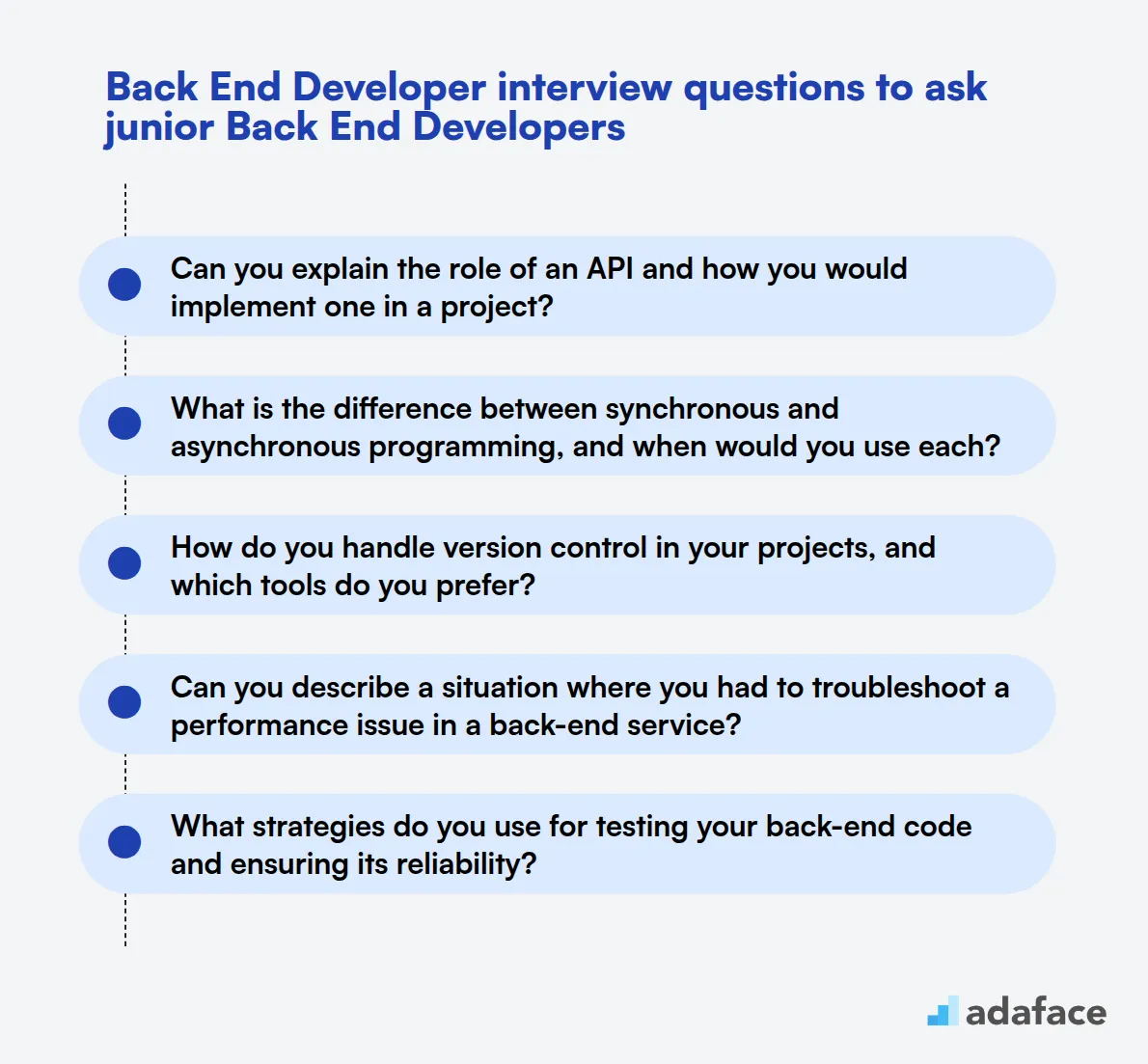
To effectively assess the technical skills of junior Back End Developers, use this list of targeted interview questions. These inquiries will help you gauge their understanding of core concepts and practical applications relevant to back-end development, ensuring you find the right fit for your team. For more context on job roles, check out our job descriptions.
- Can you explain the role of an API and how you would implement one in a project?
- What is the difference between synchronous and asynchronous programming, and when would you use each?
- How do you handle version control in your projects, and which tools do you prefer?
- Can you describe a situation where you had to troubleshoot a performance issue in a back-end service?
- What strategies do you use for testing your back-end code and ensuring its reliability?
- How do you manage dependencies in your back-end projects?
- What is your experience with cloud services, and how do you utilize them in back-end development?
- Can you explain the difference between REST and GraphQL APIs?
- How do you ensure data integrity when interacting with databases?
- What tools or methods do you use for logging and monitoring your applications in production?
- How would you approach writing documentation for a new feature you developed?
- What do you understand by microservices architecture, and how does it differ from monolithic architecture?
- Can you explain how you would implement authentication and authorization in an application?
- What is your experience with containerization, and how do you use it in your projects?
- How do you stay updated with the latest back-end technologies and practices?
- What is your approach to handling user input and preventing common security vulnerabilities?
- Can you provide an example of how you’ve used caching to improve application performance?
- What role does data modeling play in your development process?
- How do you prioritize tasks and manage deadlines in a back-end project?
- Can you discuss the significance of using a framework in back-end development?
- What are some best practices you follow while writing SQL queries?
9 Back End Developer interview questions and answers related to database management
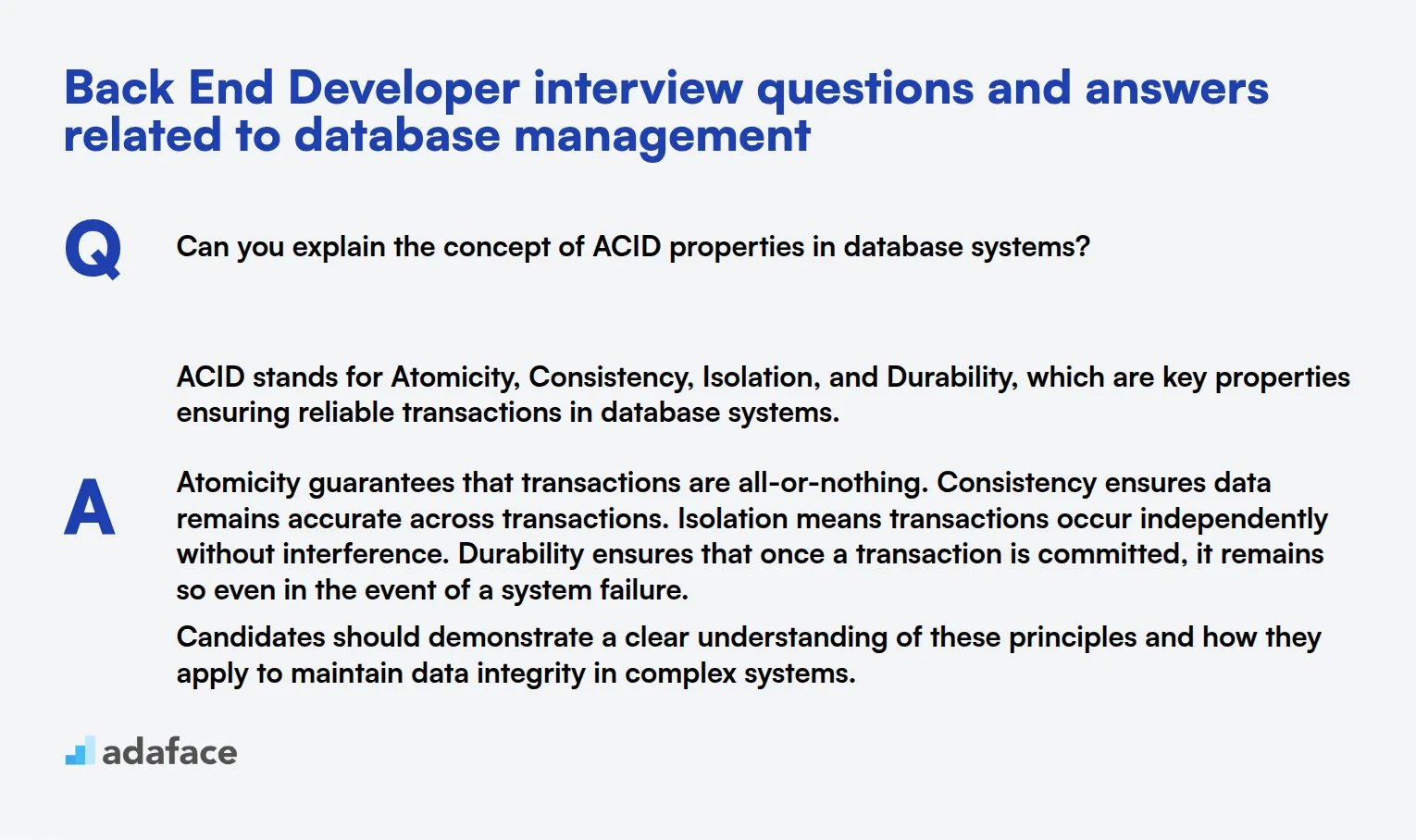
To assess whether your candidates can handle the intricacies of database management behind the scenes, consider using these carefully crafted interview questions. They're not just for quizzing knowledge; they help draw out candidates' problem-solving abilities and understanding of real-world applications. Perfect for when you want to dig deeper than just scratching the surface of a resume.
1. Can you explain the concept of ACID properties in database systems?
ACID stands for Atomicity, Consistency, Isolation, and Durability, which are key properties ensuring reliable transactions in database systems.
Atomicity guarantees that transactions are all-or-nothing. Consistency ensures data remains accurate across transactions. Isolation means transactions occur independently without interference. Durability ensures that once a transaction is committed, it remains so even in the event of a system failure.
Candidates should demonstrate a clear understanding of these principles and how they apply to maintain data integrity in complex systems.
2. How do you approach database schema design during the development process?
Database schema design requires careful planning to ensure that the data structure supports current and future business needs. It's crucial to understand the relationships between data entities and to normalize data to avoid redundancy.
A good approach involves gathering requirements, identifying entities, and defining relationships. It's also important to consider scalability and performance.
Look for candidates who can articulate the importance of a well-thought-out schema and how they adapt their design to evolving project requirements. Those who reference real-world projects, or mention using tools for schema design, often have practical experience.
3. What factors do you consider when choosing a database management system for a project?
Choosing a database management system (DBMS) depends on several factors, including the nature of the data, scalability requirements, data consistency needs, and the team's familiarity with the technology.
Considerations might include whether the application needs a relational database or a NoSQL solution for unstructured data, or whether cloud-based solutions offer the necessary flexibility and ease of management.
Candidates should show insight into how they weigh these factors and how they align them with the specific needs of a project. Experience with different database systems can be a strong indicator of versatility and adaptability.
4. How do you ensure data security and privacy within a database?
Ensuring data security involves implementing measures such as encryption, access controls, and regular security audits. It's also vital to stay updated with the latest security patches and best practices.
A robust approach includes using role-based access control, encrypting sensitive data both at rest and in transit, and regularly backing up databases.
Candidates should express a proactive mindset toward security, demonstrating awareness of common vulnerabilities and how they mitigate them. Look for those who can discuss specific tools or practices they have used to enhance data security.
5. What are the common challenges you face with database backups and how do you address them?
Common challenges with database backups include ensuring data is backed up consistently, managing storage costs, and minimizing downtime during the backup process.
Solutions often involve scheduling regular backups, using incremental backups to save space and time, and testing restore processes to ensure data can be recovered quickly and accurately.
An ideal candidate will describe specific challenges they have encountered and the strategies they employed to overcome them, highlighting their ability to maintain data integrity and system uptime.
6. How do you handle database migration when upgrading systems or moving to a new platform?
Handling database migration involves careful planning, testing, and execution. It's crucial to assess the compatibility of data between old and new systems and to ensure minimal disruption during the transition.
A typical process includes data mapping, verifying data integrity post-migration, and using tools that facilitate smooth data transfer. Testing in multiple phases helps to catch issues early.
Candidates should emphasize their attention to detail and organizational skills in managing migrations. Their response should reflect experience with both technical execution and communication with stakeholders to manage expectations.
7. Can you describe a situation where you optimized a query and what impact it had?
Optimizing queries is crucial for performance improvement. This might involve rewriting queries for efficiency, indexing columns, or analyzing execution plans to identify bottlenecks.
For instance, using indexes can significantly decrease the time it takes to retrieve data, while avoiding unnecessary data retrieval in the first place can make queries much faster.
Look for candidates who can provide a specific example, explaining both the problem and the solution they implemented. Their ability to measure and articulate the impact of their optimization efforts is a valuable trait.
8. What is your approach to handling and storing large volumes of data?
Handling large volumes of data requires a scalable and efficient storage solution, often involving distributed databases or data warehousing solutions.
Approaches may include partitioning data, using cloud storage solutions that scale dynamically, or employing data compression techniques to save space.
Candidates should show a strategic approach, considering both current data needs and future growth. Those who demonstrate experience with specific technologies or frameworks for big data are often well-prepared for large-scale challenges.
9. How do you maintain data integrity across distributed systems?
Maintaining data integrity in distributed systems requires ensuring that all copies of data are consistent and reliable. Techniques like distributed transactions, eventual consistency, and consensus algorithms can be employed.
Regularly syncing databases and using version control can help manage conflicts and ensure data accuracy. Building resilience into systems to handle network failures is also crucial.
Look for candidates who understand the complexities of distributed systems and can articulate strategies to address them. Experience with specific tools or frameworks that facilitate data consistency can be a significant advantage.
14 Back End Developer interview questions about API integration
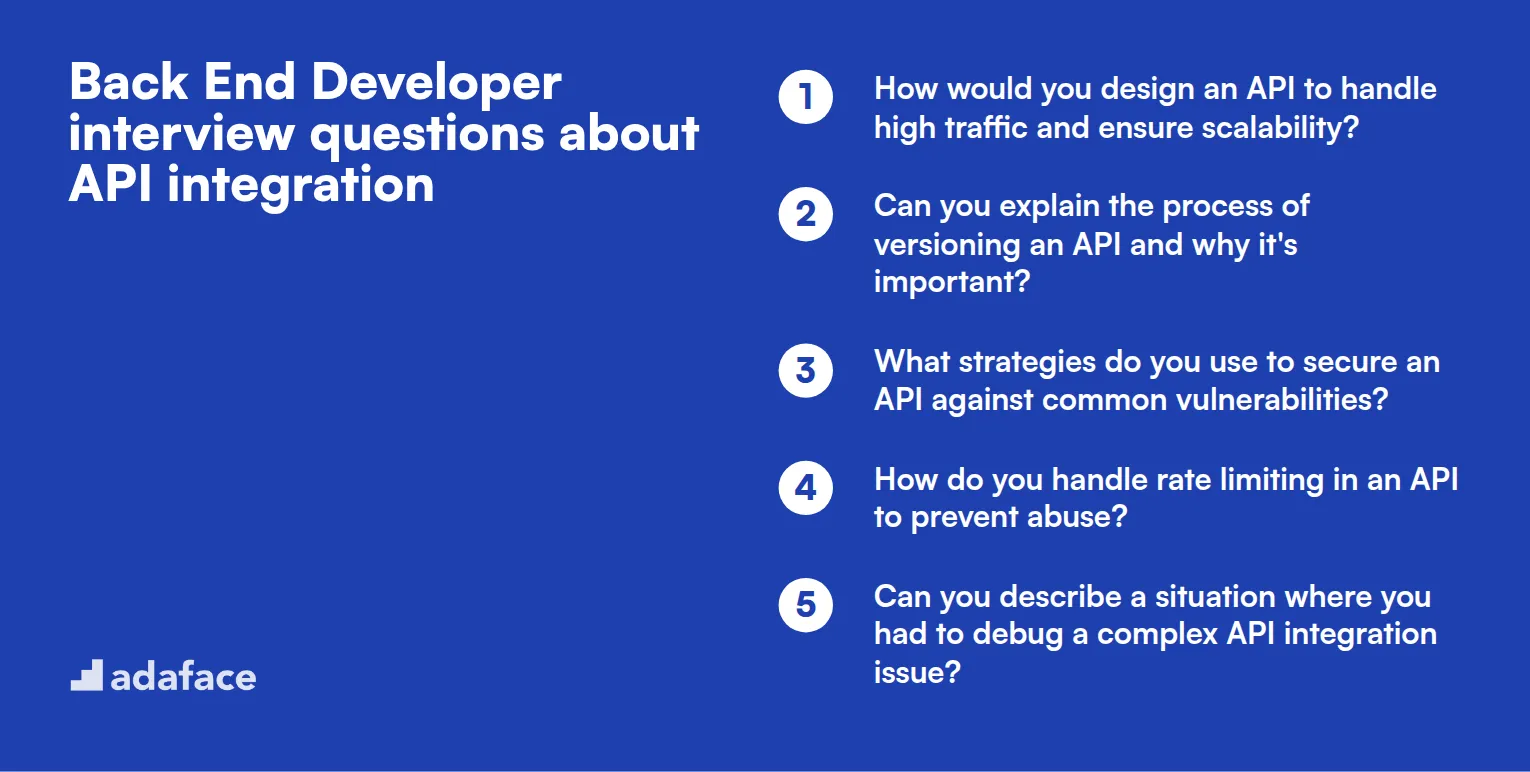
To assess a candidate's proficiency in API integration, a crucial back-end developer skill, use these targeted interview questions. They'll help you gauge the applicant's understanding of API design, implementation, and best practices, ensuring they can effectively integrate and manage APIs in your projects.
- How would you design an API to handle high traffic and ensure scalability?
- Can you explain the process of versioning an API and why it's important?
- What strategies do you use to secure an API against common vulnerabilities?
- How do you handle rate limiting in an API to prevent abuse?
- Can you describe a situation where you had to debug a complex API integration issue?
- What tools do you prefer for API documentation and why?
- How do you approach testing an API, both for functionality and performance?
- Can you explain the concept of idempotency in API design and when it's crucial?
- What considerations do you take into account when designing API endpoints?
- How do you handle error responses in APIs to make them user-friendly and informative?
- Can you describe your experience with implementing webhooks in an API?
- What strategies do you use for API caching to improve performance?
- How do you ensure backward compatibility when updating an existing API?
- Can you explain the benefits and challenges of using microservices for API architecture?
Which Back End Developer skills should you evaluate during the interview phase?
While it's challenging to assess every aspect of a candidate's abilities in a single interview, focusing on core Back End Developer skills is crucial. These key competencies form the foundation of a developer's expertise and significantly impact their performance.
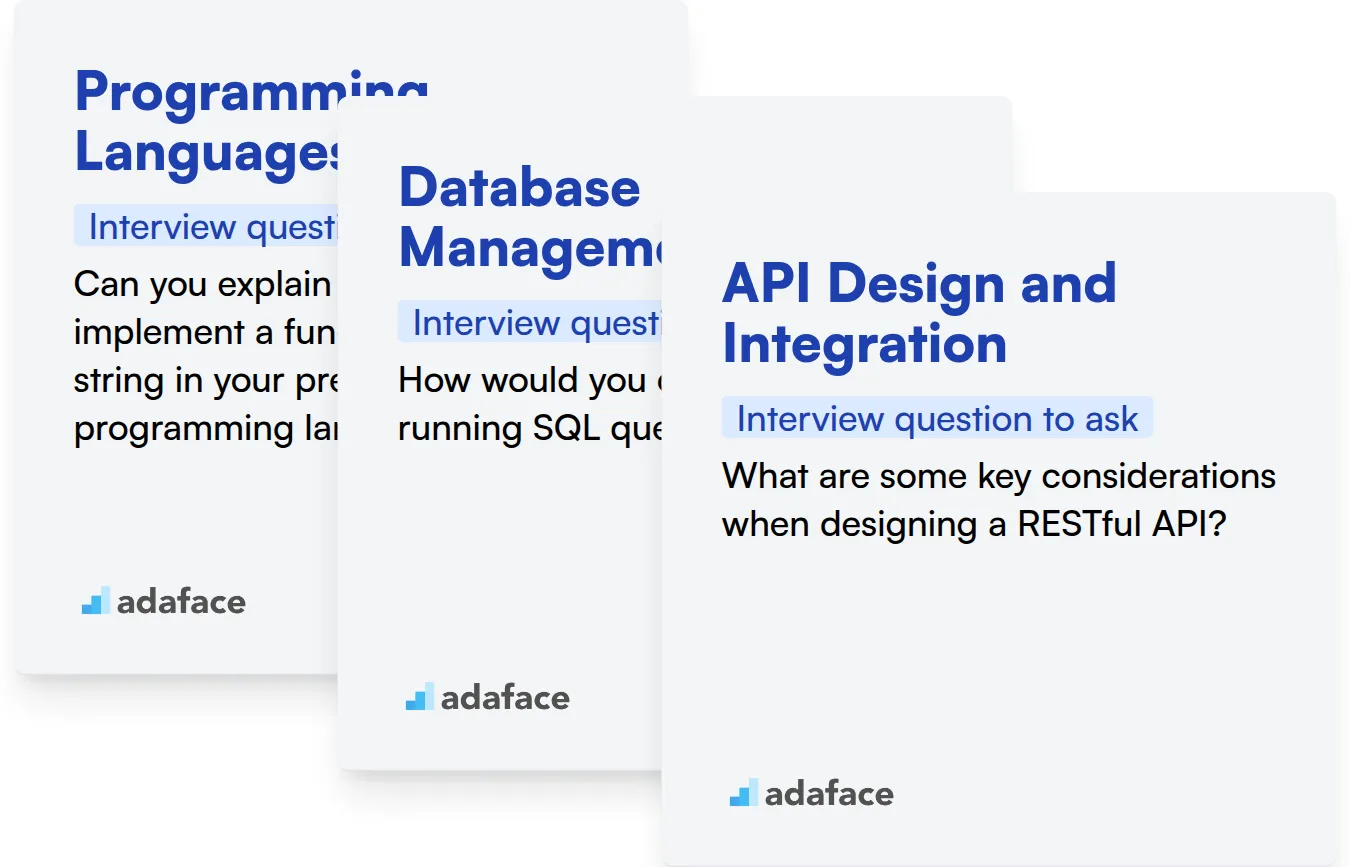
Programming Languages
Proficiency in programming languages is fundamental for Back End Developers. Languages like Python, Java, or Ruby are commonly used for server-side development.
Consider using a Python online test to evaluate candidates' programming skills. This can help filter out candidates based on their coding abilities.
To assess a candidate's programming skills during the interview, you can ask targeted questions about their preferred language.
Can you explain how you would implement a function to reverse a string in your preferred programming language?
Look for clear explanations of the algorithm, efficient use of language features, and consideration of edge cases like empty strings or non-string inputs.
Database Management
Back End Developers need to work with databases to store and retrieve data. Understanding database concepts and query languages is essential.
An SQL online test can be useful to gauge candidates' database skills before the interview.
During the interview, you can ask questions to assess the candidate's database management skills.
How would you optimize a slow-running SQL query?
Listen for answers that mention indexing, query restructuring, or analyzing the execution plan. A good candidate should demonstrate an understanding of database performance optimization techniques.
API Design and Integration
Back End Developers often need to design, build, and integrate APIs. This skill is crucial for creating scalable and efficient back-end systems.
A backend engineer assessment test can help evaluate candidates' API-related skills.
To assess API design skills during the interview, consider asking a question about best practices.
What are some key considerations when designing a RESTful API?
Look for answers that discuss versioning, proper use of HTTP methods, clear naming conventions, and security considerations. A strong candidate should be able to explain these concepts clearly.
Streamline Your Back End Developer Hiring Process with Adaface
When hiring a Back End Developer, it's important to verify their skills accurately. This ensures you find candidates who can truly contribute to your team's success.
Using skill tests is an effective way to assess candidates' abilities. Consider using Adaface's Back End Engineer Assessment Test to evaluate applicants' technical proficiency.
After candidates complete the skill test, you can shortlist the top performers for interviews. This approach saves time and helps focus on the most promising candidates.
Ready to improve your hiring process? Sign up for Adaface to access our Back End Developer tests and streamline your recruitment efforts.
Backend Engineer Online Test
Download Back End Developer interview questions template in multiple formats
Back End Developer Interview Questions FAQs
Focus on technical skills, problem-solving abilities, and experience with APIs and databases.
Ask questions about database design, normalization, and experience with SQL or NoSQL databases.
API integration is crucial for enabling communication between different software systems, which is a key part of back end development.
Challenges include scaling systems, handling database optimization, and ensuring secure data transactions.
They can discuss their projects, show enthusiasm for learning, and exhibit problem-solving skills.
Common tools include server-side languages like Java, Python, Node.js, and databases like MySQL, PostgreSQL.

40 min skill tests.
No trick questions.
Accurate shortlisting.
We make it easy for you to find the best candidates in your pipeline with a 40 min skills test.
Try for freeRelated posts
Free resources




